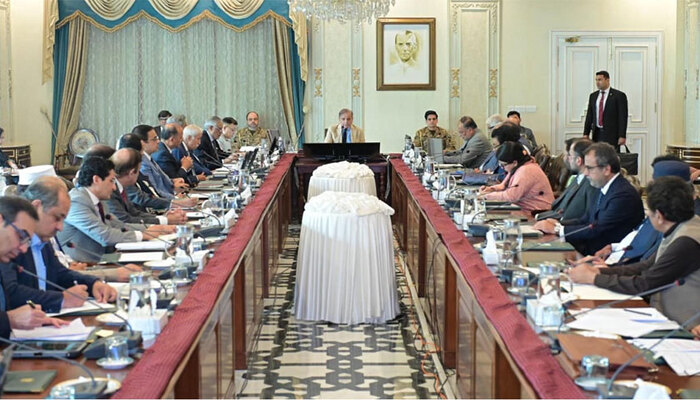The federal government has moved to enforce a nationwide climate emergency Pakistan strategy in response to heavy monsoon rains and devastating floods. Prime Minister Shehbaz Sharif announced that both climate and agriculture emergencies will be implemented immediately to address rising climatic challenges and support farmers hit by widespread crop losses.
Cabinet Approval
The decision came during a Federal Cabinet meeting chaired by Prime Minister Shehbaz Sharif in Islamabad on Wednesday. The cabinet formally approved the enforcement of climate and agriculture emergencies, highlighting the growing urgency to protect vulnerable communities and stabilize the agriculture sector.
Federal ministers said the government views this step as critical, given the scale of recent damage and the pressure on food security. The measures are designed to ensure that relief reaches affected farmers quickly while long-term policies strengthen resilience against future climate events.
Role of Provinces and Regions
Minister for Parliamentary Affairs Dr Tariq Fazal Chaudhry briefed the media after the meeting. He emphasized that the success of these emergencies will depend on close cooperation from provincial governments, including those in Gilgit-Baltistan and Azad Jammu and Kashmir.
A meeting with all provincial and regional stakeholders will be convened soon to align strategies and assign responsibilities. Dr Chaudhry stressed that the federal government will lead, but local administrations and institutions must also contribute. He underlined that climate change is a shared challenge requiring collective action.
Read: Karachi Rain Crisis: Mayor’s Remark Sparks Outrage
Agriculture Support in Focus
The agriculture emergency will prioritize farmers who have suffered heavy losses from flooding. Crops and livestock have been severely affected, threatening the livelihoods of millions. The government aims to introduce targeted subsidies, low-interest loans, and direct assistance to help farmers recover quickly.
Officials said food supply disruptions could lead to inflation and shortages if corrective measures are not taken immediately. The emergency status will allow for fast-track approvals of relief funds and quicker mobilization of resources.
Lifting of RLNG Ban
In addition to climate and agriculture measures, the government also announced relief for households and businesses facing energy shortages. Minister for Petroleum Ali Pervaiz Malik said that on persistent public demand, the ban on new Regasified Liquefied Natural Gas (RLNG) connections has been lifted.
The ban had been in place since 2021, but both gas companies have now been instructed to invite applications from consumers for new connections. This step is expected to ease energy shortages and provide households with more affordable options.
RLNG vs LPG Costs
Ali Pervaiz Malik explained that RLNG would be 30 to 35 percent cheaper than imported Liquefied Petroleum Gas (LPG). This cost difference will bring significant relief to families already under pressure from rising living expenses.
Consumers who previously applied for gas connections will also be allowed to switch to RLNG. They will need to deposit a security fee as determined by the Oil and Gas Regulatory Authority. The minister assured that the transition process will be transparent and consumer-friendly.
Focus on Local Gas Production
The petroleum minister also stressed that Pakistan cannot rely on RLNG forever. He confirmed that efforts are underway to increase local gas production. The government is working on exploration projects and efficiency improvements to reduce long-term dependence on imported energy.
By boosting domestic output, authorities hope to secure a more sustainable energy supply and shield consumers from international price fluctuations. Malik said these steps will ensure that Pakistan moves toward energy independence over the coming years.
Diplomatic Gains With China
The ministers also highlighted the diplomatic progress made during Prime Minister Shehbaz Sharif’s recent visit to China. Dr Tariq Fazal Chaudhry said that Islamabad and Beijing are entering a “new era of cooperation” across multiple fields, including infrastructure, energy, and technology.
He added that the prime minister’s meetings with world leaders reflected a positive image of Pakistan. The ability to build strong ties in a friendly manner, he noted, was a significant achievement on the international stage.
Tribute to National Sacrifice
In the cabinet session, Prime Minister Shehbaz Sharif and his ministers also paid tribute to Major Adnan Shaheed, who embraced martyrdom while fighting the militants labeled as Fitna al-Khwarij.
Dr Chaudhry said the entire nation stands firmly with the armed forces in their fight against terrorism. He emphasized that the sacrifices of soldiers like Major Adnan strengthen national resolve to defeat enemies of peace.
Toward Resilience and Stability
The dual enforcement of climate and agriculture emergencies underscores the scale of challenges facing Pakistan. Extreme weather, coupled with energy shortages, has put pressure on both families and the economy. By approving these measures, the cabinet has signaled a commitment to immediate relief and long-term resilience.
The government now faces the task of turning its directives into effective action. Provincial cooperation, transparent execution, and timely delivery will be critical in ensuring that citizens benefit fully from these emergency measures.
Follow us on Instagram, YouTube, Facebook,, X and TikTok for latest updates
